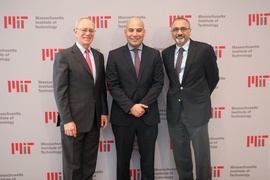MIT's Abdul Latif Jameel Poverty Action Lab (J-PAL) North America has launched a new Education, Technology, and Opportunity Competition that will support U.S. education leaders in identifying effective uses of education technology that can serve as models for how innovation can improve learning.
Amid significant spending on education technology around the country, there is growing demand for rigorous evidence on which of these technologies truly help students learn. To meet this demand, the competition is inviting education agencies, school networks, post-secondary institutions, and nonprofits to partner with J-PAL North America to evaluate their most promising technology-based education programs, particularly those aimed at improving learning for disadvantaged students.
Selected applicants will receive pro bono technical support and access to J-PAL’s network of leading affiliated professors to help them design and implement randomized evaluations of their programs. In addition, applicants may be eligible for up to $50,000 in funding from J-PAL North America to help develop the project.
“Randomized evaluations can help us learn which uses of education technology go beyond the hype,” says Phil Oreopouolos, professor of economics at the University of Toronto and co-chair of the Education, Technology, and Opportunity Initiative. "It’s vital that the research community step up engagement with the ed-tech field to help them develop, test, and continually refine interventions that truly make a meaningful difference, and avoid spending time and money on ones that don’t."
The competition aims to help education leaders answer practical questions about which education technologies work, which work best, and why, while also building the education sector’s capacity to use, create, and value evidence.
Through the competition, J-PAL North America also hopes to grow the broader evidence base for promising models in education that have the potential to scale. To date, J-PAL North America has funded randomized evaluations of a national tablet distribution program, technology-enabled behavioral interventions, video-based literacy building programs, early-childhood math games, and simplified financial aid calculators.
"It's increasingly clear that technology can allow us to personalize learning to help all students make unprecedented educational progress, but to realize its promise, we need good educational technology with rigorous content in effective models," says Michael Horn, chief strategy officer for the education technology studio Entangled Ventures. "Getting that requires a far better research base than we currently have, which makes this effort by J-PAL so promising and important."
Details on how to apply to the Education, Technology, and Opportunity Competition can be found online. Please contact Initiative Manager Vincent Quan with questions.
Applications to the competition are due on April 13, and winners will be announced by early June. J-PAL North America will be hosting a webinar on Feb. 26, from 2 to 3 p.m. ET to provide an introduction to the competition, review the application process, and respond to questions.
J-PAL North America’s education technology work is supported by the Laura and John Arnold Foundation and the Overdeck Family Foundation. J-PAL North America, a regional office of the Abdul Latif Jameel Poverty Action Lab, was established with support from the Alfred P. Sloan Foundation and the Laura and John Arnold Foundation. It works to reduce poverty by ensuring that policies are informed by scientific evidence.









